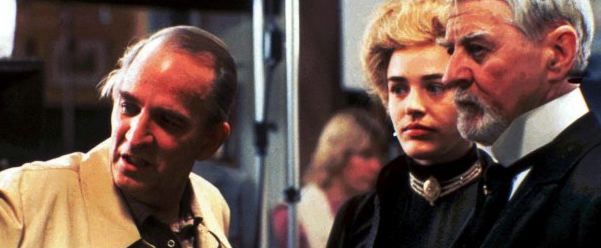Remembering Ingmar Bergman
Kierkegaard was not the last preacher for transparency of individual wellbeingness in western civilization. Bergman broke bravely the shiny eggshell of the new Scandinavian materialistic hybris, this world famous clean and well defined welfare state certified vacuum happiness. Bergman´s art was kind of new phase of Gogol´s and Dostojevski´s heritage. He stretched tragicomedy in it´s modern level and there is no mistake Woody Allen sees Bergman as his grand tutor.
Bergman broke misused Greek "three act dramaturgy"-formula, that American plot neurosis to set structure and form most important. His approach to film-making was focused on characters in this time, not copying thousand year old story lines or mythically dull obviousnesses. Contrast and shades should always grow with watcher´s self reflection. Character centered journey defy the commercial tendencies to have illusion of perfect control, perfect imago. Bergman proved that feature film´s deconstructive grip can also be mesmerizing. Specially our overflowing digital media age is fast creating absolute need for surprisingly subjective story telling. Consumption of experiences is no more matter of easiness.
For Bergman an audience of one, each watcher is ultimately subjective observer, observing always primarly own reactions and life experiences. Film art doesn´t need to have hopelessly entertain audience or get defined as "primarly visual art form". New Nordic film makers should see the Bergman´s lasting existentialistic impact in it´s brave focus on human defences, traumas and obsessive impulses under society´s status answers that distorts each individuation process endlessly through neurotic control culture. Look inside, grab substance, see the light.
Commercial form of film industry stands now on fluttering claw foot and there is growing demand for army of independent productions in the spirit of Bergman. Bergman´s legacy is to set free from legacies. Learn, forget, express.
Arhi Kuittinen, Finland
Demonology
Early in his career, Ingmar Bergman earned
the nickname of the "demon director".
His own personal demons are legendary, too.
Early in his career, Ingmar Bergman earned
the nickname of the "demon director".
His own personal demons are legendary, too.
Persona, Suden hetki, Hiljaisuus, Kuiskauksia ja huutoja, Kohtauksia, Kuin kuvastimessa ovat psykoanalyyttisen ihmiskuvan ja sen kysymysten parasta aineistoa. Länsimaisen ihmisen traumaattinen ja neutroottinen elämänhallinta on näissä elokuvissa mainiosti ja elävästi kuvattu - ilman freudilaista käsitemongerrusta.
"Persona" on Bergmanin elokuvista se tykein ja abstraktein. Jos olet nähnyt vain Bergmanin vanhempia romanssisekoiluja, niin tämä elokuva voi luoda hieman erilaisen perspektiivin pohjoismaiseen elokuvaan.
Tässä elokuvassa Bergman syväluotaa järkyttävän selvänäköisesti länsimaalaisen ihmisen pakkomielteistä tarvetta luoda rooleja kelvatakseen ja määrittääkseen itseään muiden ihmisten hyväksynnän kautta.

Bergman ei tehnyt eroa henkisen ja fyysisen väkivallan välille.
Kävin kesäkuussa katsomassa Elokuva-arkistossa Jörn Donner:in karun haastatteludokumentin INGMAR BERGMANIN MAAILMA (Tre scener med Ingmar Bergman), Suomi 1976. Aikamoista häpeän valtaa oli pikku Ingmar joutunut kokemaan. Jos hän oli isän hakkaamisen tai tukasta repimisen jälkeen kastellut vuoteensa, hän joutui pukeutumaan äidin avustuksella seuraavana päivänä tytön pukuun - koko päiväksi. Melkein kaikki sarjamurhaajathan ovat myös nimenomaan tämän saman seksuaali-identiteetin kyseenalaistamis-häpäisytoimenpiteen uhreja. Onko äidin tyttö nyt kiltisti?
Bergman piti kasvatustaan selkeästi järjestelmällisenä kidutuksena, jossa harkitusti tuotettiin lapselle tuskaa ja lamaannusta. Lapsi ei saanut kokea turvallisempaa lapsuutta kuin vanhemmat, sillä aikuisen olisi silloin täytynyt tunnistaa viha vanhempiaan vastaan. Viha lapsia kohtaan oli siten helpotus vanhemmalle ja hänen sadistisille ratkaisuilleen. Vihan helpottava pako menneisyyden tulkinnasta.
Woody Allen:
Only in the late 50’s, when I took my then wife to see a much talked about movie with the unpromising title ‘’Wild Strawberries,'’ did I lock into what was to become a lifelong addiction to the films of Ingmar Bergman. I still recall my mouth dry and my heart pounding away from the first uncanny dream sequence to the last serene close-up. Who can forget such images?
In addition to all else - and perhaps most important - Bergman is a great entertainer; a storyteller who never loses sight of the fact that no matter what ideas he’s chosen to communicate, films are for exciting an audience. His theatricality is inspired. Such imaginative use of old-fashioned Gothic lighting and stylish compositions. The flamboyant surrealism of the dreams and symbols. The opening montage of ‘’Persona,'’ the dinner in ‘’Hour of the Wolf'’ and, in ‘’The Passion of Anna,'’ the chutzpah to stop the engrossing story at intervals and let the actors explain to the audience what they are trying to do with their portrayals, are moments of showmanship at its best.
There is no building saga of how he began and gradually worked himself up to dominate the Swedish stage and screen. The story skips around, back and forth, apparently depending on the author’s spontaneity. It includes odd tales and sad feelings. An odd tale: as a young boy being locked inside a mortuary and becoming fascinated by the naked corpse of a young woman. A sad feeling: ‘’My wife and I live near each other. One of us thinks and the other answers, or the other way round. I have no means of describing our affinity. One problem is insoluble. One day the blow will fall and separate us. No friendly god will turn us into a tree to shade the farm.'’ It leaves out things you’d bet he’d discuss.

kw: condolences memoriam memorium dead passed away history timeline











2 kommenttia:
Tulee muuten käsittääkseni TV1:ltä perjantaina tuo Donnerin dokkari.
Voi olla että tuo perjantin dokkari on se toinen Donnerin dokkari, jossa analysoidaan enemmän hänen käsikirjoituksiaan ja elokuviaan...
Lähetä kommentti